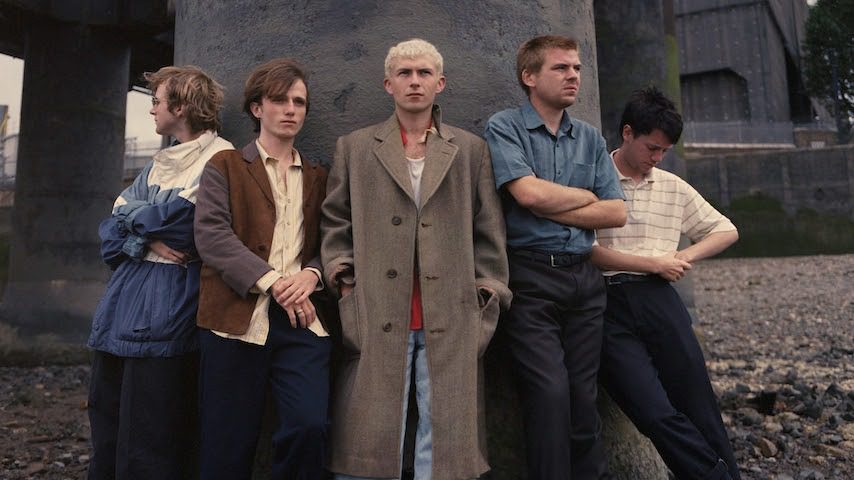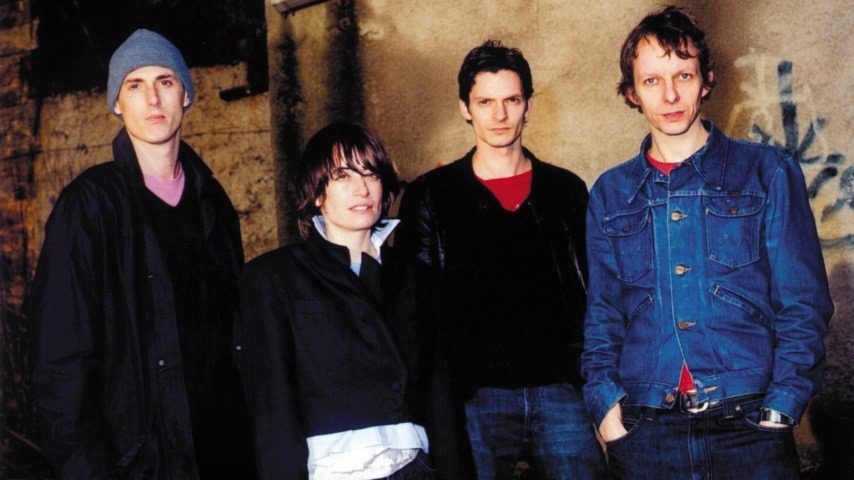Record Time is Paste’s monthly column that takes a glimpse into the wide array of new vinyl releases that are currently flooding record stores around the world. Rather than run down every fresh bit of wax in the marketplace, we’ll home in on special editions, reissues and unusual titles that come across our desk with an interest in discussing both the music and how it is pressed and presented. This month five subwoofer rattling reissues from a post-punk powerhouse, a new album from a stalwart Bay Area funk group and the classic debut from Fourth World pioneer Jon Hassell.
African Head Charge: Drumming Is A Language: 1990-2011 (On-U Sound)
According to legend, Adrian Sherwood conceived of his long-running project African Head Charge after hearing Brian Eno talk about—as the title of a 2005 AHC album puts it—a Vision of a Psychedelic Africa. Since the group’s first release in 1981, Sherwood and the many artists who have cycled through the ensemble have made that vision a reality, one bass-heavy tune at a time. On-U Sound, the label that Sherwood has helped run during throughout, is keeping that vision alive this month with the re-release of four AHC albums—Vision, 1990’s Songs of Praise, 1993’s In Pursuit of Shashamane Land and 2011’s Voodoo of the Godsent—as well as a set of outtakes from the Praise and Pursuit sessions. You can pick them up as a deluxe CD set, a vinyl bundle or a la carte.
For anyone looking to dip their toes in and just snag one of these double LP sets (each comes with a lovely poster that includes an interview with AHC co-leader Bonjo Iyabinghi Noah), there’s really no bad place to start. All five records are thick with grooves and Sherwood’s playful production techniques. The emphasis is on rhythm, with ropey basslines provided by legendary players like Wayne Nunes, Doug Wimbish (Living Colour), and Ras Levi, and a heady cluster of percussion instruments. Folks tend to lean toward Praise as being the high water mark for AHC, but I wouldn’t miss out on the fluid churning of Vision or the dub mixes that take up the second side of the outtakes record Churchical Chant of the Iyabinghi.
Broken Social Scene: Live at Third Man Records (Third Man)
Back in 2018, the many, many members of Broken Social Scene squeezed on to the humble stage of Third Man Records’ Nashville location to do what they do best: ripple the skins of everyone in attendance with blasts of heartfelt indie rock. This live recording (captured, as all Third Man sets are, live to acetate) dips into various points of the BSS discography, going all the way back to the group’s 2002 breakthrough album You Forgot It In People. The Canadian supergroup leans hard into each one, finding the core beauty of “Superconnected” and the driving expanse of “It’s All Gonna Break” with seemingly minimal effort. It’s on that last track, though, that BSS truly prove their mettle as the four-guitar strong lineup gives itself room to splay out and kick up one hell of a righteous storm. The dual saxophone bleats only sweeten the deal.
Rowland S. Howard: Teenage Snuff Film (Fat Possum)
After stints in the Birthday Party and Crime and the City Solution, as well as leading his own project These Immortal Souls, Australian blues-skronk firebrand Rowland S. Howard finally saw fit to record a solo album, Teenage Snuff Film, in 1999. I only mention those other projects as it couldn’t hurt to know some of his lineage heading into your first needle drop on this Fat Possum reissue, as Snuff feels like a final formation of Howard’s intent as a songwriter and a musician. His lyrics are stained with a bleak romanticism informed by the Beats, Harry Crews and Bukowski, and the music grinds and yaws like a steam-powered locomotive. This fresh pressing finishes off the work that Mississippi label Fat Possum has done in recent years to honor Howard—they previous reissued his 2009 album Pop Crimes—and they treat the music with appropriate care. The three-sided LP (side four is an etching) is clean and exact, letting Howard’s feverish guitar work and languid vocals take charge. He pulls behind him a simple rhythm section, including his longtime collaborator Mick Harvey on drums, and interpretations of Billy Idol’s “White Wedding” and “She Cried,” a ‘60s pop tune recorded by both the Shangri-Las and Johnny Thunders.
Tower of Power: Step Up (Artistry Music)
The latest album from this Bay Area jazz-funk combo is something of a torch-passing. Founding members Emilio Castillo, Stephen Kupka and Dave Garibaldi are all still in the fold, but their 19th studio album finds both bassist Francis Prestia, who was part of the original lineup, and their vocalist Ray Greene, handing the reins to some younger guns. For most other bands, those lineup shake-ups would be small causes for alarm, but TOP has five decades’ worth of membership changes and it hasn’t slowed them down one bit, nor has it had a noticeable effect on their horn-heavy sound. Which is to say that new vocalist Marcus Scott has slipped into the role of frontman with ease, adding a shot of energy to the three songs that he sings lead on, while Greene settles comfortably into the fine-tuned grooves of each track on this double LP set. That goes double for the rest of Step Up. TOP are smart enough to not mess with the core sound that turned them into a consistently great touring act, even 50 years after they first tread the boards together in the late ‘60s. It’s a dance party cut into four sides of vinyl and ideal for the sunnier days ahead.
Early Day Miners: Placer Found (20th Anniversary Edition) (Secretly Canadian)
Indiana outfit Early Day Miners set the template for the next two decades of their career from the first notes of their debut Placer Found: glassy guitar tones, sedate tempos and a mood that took the slowcore template of Codeine and Low and adapted it for the emo generation. On the occasion of this album’s 20th birthday, Secretly Canadian is issuing it on vinyl for the first time, giving it a double LPs worth of room to play with and adding an additional splash of unreleased material from the recording sessions. On its own, Placer has the arc and drama of a great piece of expressionist cinema, all cockeyed angles and creeping shadows building toward the dramatic conclusion of “Desert Cantos” that feels like a fire slowly overtaking a structure. Nothing to do but watch it burn. The added tracks—a pair that take up the fourth side of this two-LP set—are great additions that flesh out the backstory of this album in a manner that helps to more fully appreciate what they achieved. They don’t detract from the starry beauty of Placer (remastered and remixed with care by Paul Mahern) and might have nestled comfortably into the original tracklist, but they’re not necessary to continue appreciating the album as it stands. That said: the distractions come from some surprisingly noisy vinyl. At several points, the quieter passages are cut through with noticeable crackling and rumbling—a disappointing development for a record fresh out of the shrinkwrap.
Cocteau Twins: Garlands/Victorialand (4AD)
After already reissuing the other LPs that Cocteau Twins released on the label, 4AD is finishing the job this month with remastered editions of the group’s 1982 debut Garlands and their 1988 minimalist beauty Victorialand. While I’ve heard some complaints about the poor quality of the 2014 reissues of Heaven Or Las Vegas and Blue Bell Knoll, there is nothing to fret about with this pair. Working with the original analog master tapes has brought new life to every shimmer and filigree of two albums that found the Twins at key points in their history. For Garlands, it was announcing their dream pop aesthetic to the world through guitarist Robin Guthrie’s heavily processed sound and Elizabeth Fraser’s otherworldly vocals. With Victorialand, it was reckoning with the temporary departure of bassist Simon Raymonde and an attempt to arrive at the same harrowing sound without rhythms. As much as I love the music on the former, it’s the formal challenge of the latter that has sent me back to its soft embrace for years.
Jon Hassell: Vernal Equinox (Ndeya)
The personnel listed on the back of Jon Hassell’s debut album only offers slight hints of what the novice listener might expect when dropping the needle on this reissue: percussionists Nana Vasconcelos and William Winant, synth pioneer David Rosenboom, guitarists Michael Brook and Larry Polansky (working in technical roles). But even knowing a bit of each artists’ work will only get you partway to what Hassell created on Vernal Equinox. It was the first flushes of his self-proclaimed “Fourth World” sound that blended musical ideas from Africa, Asia and South America and fed them into the welcome arms of new technology like early effects pedals and modular synths (the ARP, Buchla and Serge synthesizers all make appearances here), all led by Hassell’s heavily processed trumpet. The music on Vernal floats between stations—shortwave broadcasts from around the globe battling for attention and creating juxtapositions that shouldn’t work yet somehow make perfect sense when combined like this. Hassell, with remastering assistance from Al Carlson and new lacquers cut by John Bonati, oversaw the re-release of this album, as part of his work to secure his bag and his legacy via his own label Ndeya, which should assure you as to the quality within. The strange allure of these spirituous compositions is still reaching out to fresh ears some 43 years after its original sessions. It’ll hook you if you let it.
Sopwith Camel: The Miraculous Hump Returns From the Moon (Real Gone Music)
Sopwith Camel were an ill-fated affair. After the band scored a fluke hit with their 1966 single “Hello, Hello”—one of the first breakout tunes of the San Francisco psych scene—they split up. And after the original members joined forces again a few years later to record this 1971 follow up, they lost all their equipment in a tour van fire. What came out of their brief history, though, were a pair of adventurous and splashy LPs that, on this second album especially, found the group dabbling in jazz-soul, Indian classical music-tinged folk, loping country and, on the final minute of the album, a proto-post rock groover that ends far, far too quickly. While original copies of Hump are easy and inexpensive to come by, this new pressing is more than welcome. The music sounds spiffy and bright, with the high end of the group’s copious use of keyboards and horns blinking out like beacons amid their foggier low end. The colored vinyl, as ever, does it no favors, but with the right adjustments to your stereo’s settings, the music will get its due.
The Bonniwell Music Machine: The Bonniwell Music Machine (Real Gone Music)
Sean Bonniwell spent his younger days on a quixotic quest for pop success. For a moment in 1966, he found it with his garage band the Music Machine and their sole Top 10 single “Talk Talk,” but after that group fell apart, he drifted toward whatever sound he thought would score him another hit. His 1968 album, released as the Bonniwell Music Machine, reflected that catch-all approach with fine acid rockers (“Double Yellow Line,” “Absolutely Positively”) sitting next to feathery folk (“The Day Today”) and horn-flecked soul (“I’ve Loved You”). Somehow, these varied approaches cohere on this full album—a secret success of the psych explosion of the late ‘60s. Why it’s taken until this year to get a proper vinyl reissue of this disc is a true mystery, as is the decision to press it on soft colored wax that can warp easily. My copy has a small wave in it that doesn’t affect play but is noticeable as it spins along.
OXZ: Along Ago: 1981-1989 (Captured Tracks)
It’s taken far too long for Osaka post-punk trio OXZ to get the international attention they clearly deserved. Some of that has to do with how the all-girl group was marginalized within the Japanese rock scenes solely on the basis of their collective gender. But hearing this collection that pulls together the group’s entire recorded work, it’s a wonder that a UK or US indie label didn’t leap at the chance to canonize them before now. The trio’s sound is a perfect crystallization of the new wave/darkwave aesthetic, but with added dashes of color and ebullience that their contemporaries like Killing Joke or the Birthday Party wouldn’t touch. To that end, the music is scratchy, minimalist and direct, eschewing a lot of the overbearing production or the chirping cheeriness that helped their buddies in Shonen Knife find an international fanbase. An added bonus to the fantastic compilation is the addition of a well-designed booklet that spells out OXZ’s history through interviews with the former members of the group alongside tons of photos and ephemera.




